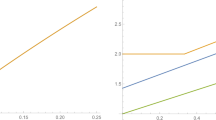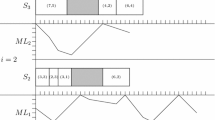Abstract
Most literature in scheduling assumes that machines are available simultaneously at all times. However, this availability may not be true in real industry settings. In this paper, we assume that the machine may not always be available. This happens often in the industry due to a machine breakdown (stochastic) or preventive maintenance (deterministic) during the scheduling period. We study the scheduling problem under this general situation and for the deterministic case.
We discuss various performance measures and various machine environments. In each case, we either provide a polynomial optimal algorithm to solve the problem, or prove that the problem is NP-hard. In the latter case, we develop pseudo-polynomial dynamic programming models to solve the problem optimally and/or provide heuristics with an error bound analysis.
Similar content being viewed by others
References
Adiri, I., Bruno, J., Frostig, E., and A.H.G. Rinnooy Kan, “Single Machine Flow-Time Scheduling with a Single Breakdown,” Acta Informatica, 26, (1989), pp. 679–696.
Baker, K., Elements of Sequencing and Scheduling, (1993), unpublished manuscript.
Blazewicz, J., K. Ecker, G. Schmidt, and J. Weglarz, Scheduling in Computer and Manufacturing Systems, Springer-Verlag, 1993, New York.
Garey, M. R., and D. S. Johnson, Computer and Intractability: A Guide to the Theory of NP-Completeness, W.H. Freeman and Company, 1979, New York.
Graves, S. C., “A Review on Production Scheduling,” Operations Research, 29, (1981), pp. 646–676.
Herrmann, J., C.-Y. Lee, and J. Snowdon, “A Classification of Static Scheduling Problems,” in Complexity in Numerical Optimization, P. M. Pardalos (ed.), (1993), pp. 203–253, World Scientific.
Kaspi, M. and B. Montreuil, “On the Scheduling of Identical Parallel Processes with Arbitrary Initial Processor Available Times,” Research Report 88-12, School of Industrial Engineering, Purdue University, 1988.
Kraemer, F., ad C.-Y. Lee,` “Common Due-Window Scheduling,” Production and Operations Management, 2, (1993), pp. 262–275.
Lawler, E.L., J.K. Lenstra, A.H.G. Rinnooy Kan, and D. Shmoys, “Sequencing and Scheduling: Algorithms and Complexity,” in Handbook in Operations Research and Management Science, Vol. 4: Logistics of Production and Inventory, S.S. Graves, A.H.G. Rinnooy Kan, and P. Zipkin (eds.), pp. 445–522, North-Holland, New York, 1993.
Lee, C.-Y., “Parallel Machines Scheduling with Non-Simultaneous Machine Available Time,” Discrete Applied Mathematics, 30,(1991), pp. 53–61.
Lee, C.-Y., “Minimizing the Makespan in the Two-Machine Flowshop Scheduling Problem with an Availability Constraint,” (1995), submitted for publication.
Lee, C.-Y., and S. D. Liman, “Single Machine Flow-Time Scheduling With Scheduled Maintenance,” Acta Informatica, 29, (1992), pp. 375–382.
Lee, C.-Y., and S. D. Liman, “Capacitated two-parallel machines scheduling to minimize sum of job completion times,” Discrete Applied Mathematics, 41, (1993), pp. 211–222.
Lei, L., and T.-J. Wong, “The Minimum Common-Cycle Algorithm for Cyclic Scheduling of Two Material Handling Hoists with Time Window Constraints,” Management Science, 37, (1991), pp. 1629–1639.
Liman, S., Scheduling with Capacities and Due-Dates, Ph.D. Dissertation, Industrial and Systems Engineering Department, University of Florida, 1991.
Morton, T. E., and D. W. Prentico, Heuristic Scheduling Systems, John Wiley & Sons, Inc. New York, 1993.
Mosheiov, G., “Minimizing the Sum of Job Completion Times on Capacitated Parallel Machines,” Mathl. Comput. Modelling, 20, 1994, pp. 91–99.
Pinedo, M., Scheduling: Theory, Algorithms, and Systems, Prentice Hall, 1995, Englewood Cliffs, New Jersey, 1995.
Sahni, S., “Approximation Algorithms for the 0/1 Kanpsack Problem,” Journal of the Association for Computing Machinery, 20, 1975, pp. 115–124.
Schmidt, G., “Scheduling Independent Tasks with Deadlines on Semi-identical Processors,” Journal of Operational Research Society, 39, 1984, 271–277.
Tanaev, V. S., Y. N. Sotskov, and V. A. Strusevich, Scheduling Theory. Multi-Stage Systems, Kluwer Academic Publishers, 1994, The Netherlands.
Author information
Authors and Affiliations
Additional information
This research was supported in part by NSF grant DDM 9201627
Rights and permissions
About this article
Cite this article
Lee, CY. Machine scheduling with an availability constraint. J Glob Optim 9, 395–416 (1996). https://doi.org/10.1007/BF00121681
Issue Date:
DOI: https://doi.org/10.1007/BF00121681




